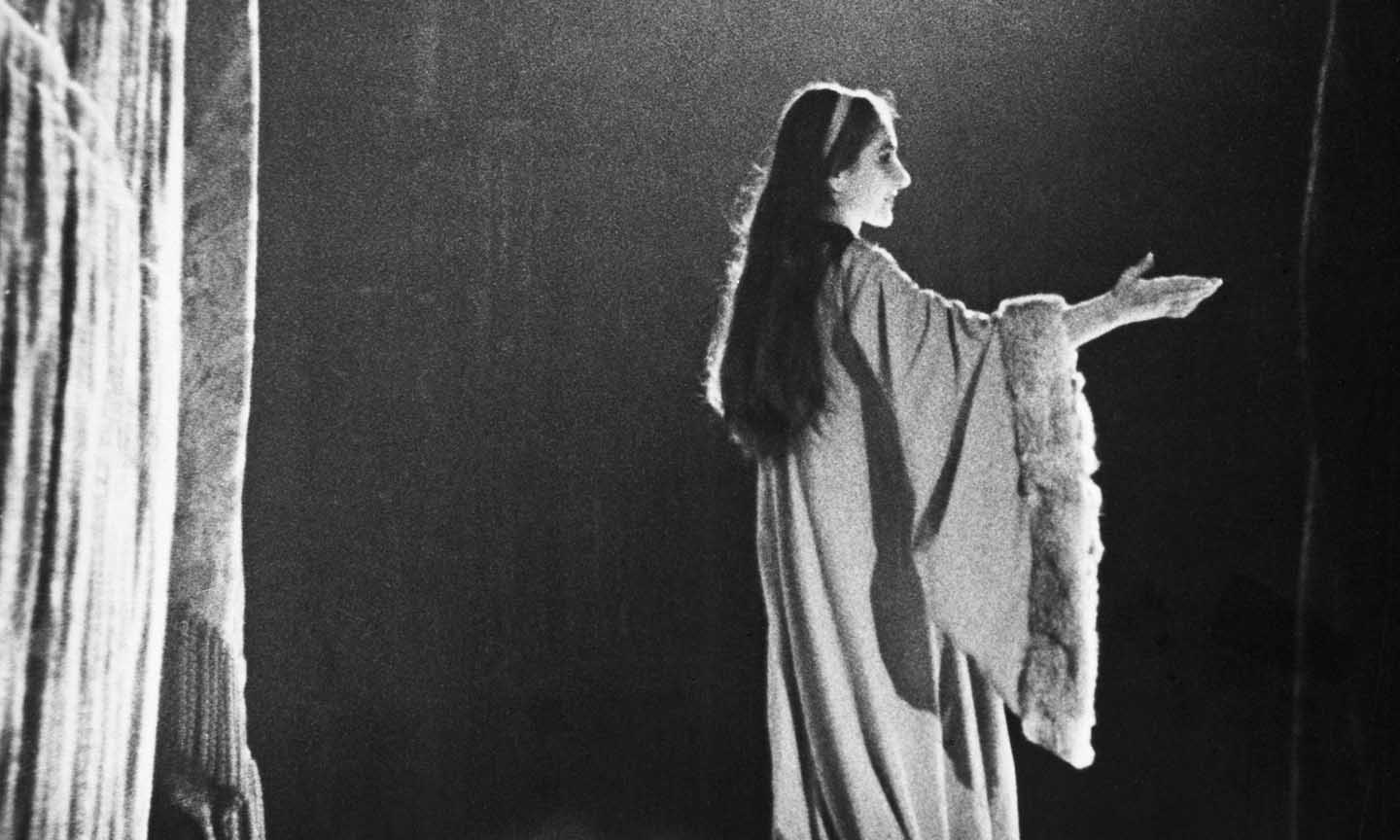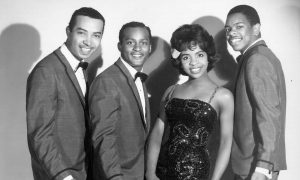Who are the best sopranos of all time? Picking the top 10 greatest sopranos is an impossible task. Do you opt for old-school divas like Maria Callas or Montserrat Caballé or today’s superstars – Anna Netrebko or Renée Fleming? Pure, perfect early-music voices or massive Wagnerian ones? We’ve discussed and debated and compiled our list of the greatest sopranos featuring old-school divas and today’s superstars. Scroll down to read and listen to our selection of the best sopranos of all time.
Listen to Renée Fleming’s Lieder on Apple Music and Spotify.
Maria Callas
“The Queen of La Scala,” “La Divina,” “The Bible of Opera” – who else but Maria Callas? The soprano saw herself as two people – Callas the artist, and Callas the woman – but for audiences it was the intoxicating blur of the two that would elevate her from performer to legend. Callas’s repertoire extended from the frothy bel canto of Donizetti to Wagner. Tosca, however, will always be Callas’s greatest role. Her passionate declaration ‘Vissi d’Arte, Vissi d’Amore’ (‘I Lived For Art, I Lived For Love’) might just as easily have been the singer’s own.
Joan Sutherland
When Pavarotti calls you “the voice of the century”, you know you’re something special. Perhaps the best coloratura soprano of all time, Sutherland was celebrated for her extraordinary range, silvery tone, and for her agility. A chance encounter with “a young pianist from Bondi” changed her life; Richard Bonynge became her husband and musical mentor, steering her away from Wagner and into bel canto repertoire. Famously down to earth, Sutherland nevertheless found her niche in Donizetti and Bellini’s histrionic and highly-strung heroines – Lucia, Norma, Amina – though her own favorite was tomboy Maria in joyous comedy La Fille Du Régiment.
Montserrat Caballé
In April 1965, American mezzo Marilyn Horne pulled out of a performance of Donizetti’s Lucrezia Borgia at Carnegie Hall. By May, her last-minute replacement had become a star. Caballé’s swift success, and a career that saw her perform at New York’s Metropolitan Opera an astonishing 99 times, was driven by her infamously good technique. Capable of enormous feats of breath control and extreme pianissimos, she quickly established herself as a major player in the bel canto revival. Singing all the major Verdi, Donizetti, and Bellini heroines, Caballé’s greatest (and most unexpected) hit was her brief foray into pop music – duetting with Freddie Mercury on ‘Barcelona.’
Kiri Te Kanawa
A voice of unusual warmth and mellowness set New Zealand soprano Kiri Te Kanawa apart. Sir Colin Davis remembers an early audition: “I couldn’t believe my ears, it was such a fantastically beautiful voice.” It was a voice made for noble, sensuous roles – Strauss’s Marschallin, Elisabeth de Valois, Anna Bolena. Her big break came as Countess Almaviva in The Marriage of Figaro at Covent Garden, but more dramatic was her Met debut – stepping in to sing her first Desdemona at three hours’ notice. Offstage, Kanawa made headlines with her rendition of ‘Let The Bright Seraphim’ at Charles and Diana’s wedding.
Lucia Popp
Singing was only Austrian-Slovak soprano Popp’s third career choice, flirting with medicine and theatre before settling on music. Her gilded voice went through a similar metamorphosis, maturing from a student mezzo to a young coloratura soprano (singing perhaps the finest ‘Queen Of The Night’ on record), before developing a weightier, lyric quality suited to Wagner as well as Mozart – eventually Eva from Die Meistersinger Von Nürnberg would become one of her most successful roles. Popp was anything but a classic diva, and this same sweetness pervades her many recordings, which include lieder as well as the classic operatic roles.
Renée Fleming
“In my long life, I have met maybe two sopranos with this quality of singing.” But who were Sir Georg Solti’s star sopranos? Renata Tebaldi and Renée Fleming. Winning the Metropolitan Opera Auditions was a major turning point for Fleming; she was booked to sing the Countess in The Marriage Of Figaro at Houston Grand Opera, making a spectacular debut. Since then, this rich, lyric soprano, the Met’s go-to diva, has roamed widely across traditional boundaries of repertoire, singing Strauss, Verdi, and Mozart, as well as contemporary music. Fleming is one of the greatest sopranos of our time and captivates audiences with her sumptuous voice, consummate artistry, and compelling stage presence.
Victoria De Los Ángeles
A soprano with no real interest in the limelight, an innocent playing opera’s scandalous women, Victoria de los Ángeles was opera’s most delightful paradox. After winning a major singing competition, the 24-year-old De los Ángeles received a phone call from La Scala: could she come immediately and audition? She declined; she had promised to go straight home to her parents. It proved no setback, and the soprano made her debut at the Met, Covent Garden and La Scala in a single triumphant season. Puccini, Debussy, Wagner –De los Ángeles sang it all, but was always happiest on the concert platform.
Jessye Norman
With a personality to match her powerful voice, Jessye Norman is a fixture among opera’s legends. The African-American soprano couples sheer power with a richness and depth of tone that was made for Wagner’s heroines – Isolde, Elisabeth, Kundry, Sieglinde – Strauss’s songs, as well as Purcell’s Dido and Gluck’s Alceste. Norman was also the first singer to appear at the Met in a single-character production – Schoenberg’s Erwartung. Norman’s voice has been resoundingly praised for its mastery of expression, technical control, and sheer power, while her diverse song repertoire spans standard and obscure operas to German lieder, avant-garde works, and even popular ballads.
Anna Netrebko
In 2007 Anna Netrebko became the first soprano to feature in Time magazine’s Time 100 list. Her story is a musical fairy tale, from cleaning floors at the Mariinsky Theatre to making her debut at just 22. Her breakthrough Donna Anna at the Salzburg Festival in 2002 led to engagements at La Scala, Covent Garden, and Carnegie Hall. Netrebko’s gilded, lyric soprano and acting abilities make her a natural fit for opera’s great heroines – Mimì, Violetta, Juliette. Anna Netrebko’s beautiful, dark and distinctive sound, coupled with her elegant and alluring stage presence have won her both popular and critical acclaim worldwide.
Lise Davidsen
Lise Davidsen shot to prominence in the summer of 2015 when she was crowned winner of the Queen Sonja singing competition in her native Norway. Davidsen went on to win three awards – the First Prize, Birgit Nilsson Award, and Audience Prize – at Plácido Domingo’s Operalia competition, where she was hailed as “the real deal” by the Financial Times. Since her breakthrough Lise has made a series of acclaimed opera debuts. She is the first operatic soprano to debut at No. 1 in the UK Classical Charts with her self-titled album of Strauss and Wagner songs.




